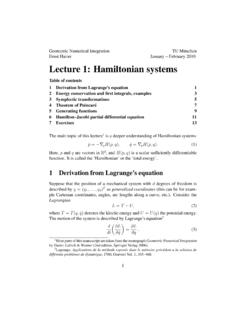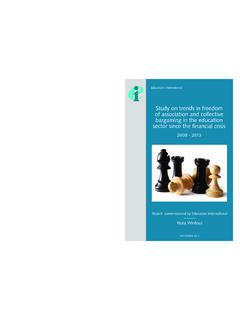Transcription of Mise en page 1 - UNIGE
1 ToxicologySeptember2016 June2018 EPGLE cole de Pharmacie Gen ve - LausanneMASM aster of Advanced StudiesMa trise universitaire d tudes avanc esThe only part-time curriculum in Toxicology in Switzerlandcompatible with the needs of scientists already in employmentFACULT DE M DECINEFACULT DES SCIENCESC ontactSecretariat | Service of Pharmacology and ToxicologyGeneva University HospitalsRue Gabrielle-Perret-Gentil 4 Tel +41 (0)22 372 91 95 | Fax +41 (0)22 372 99 Master of Advanced Studies in Toxicology provides acomprehensive educational programme recognized bynational and international professional bodies as apostgraduate academic qualification in toxicology. It isdesigned to fulfill the needs of recently graduated studentswho are already in employment and potential employers inindustry, academia and regulatory assessment of the potential risk of chemicals andpharmaceuticals to which humans and the environment areexposed provides the necessary basis for protection increasingly complex process has created a demand forqualified scientists in industry, academia and regulatory bodies withthe appropriate knowledge, experience and professional MAS in Toxicology was initiated in 2010 by the Swiss Centre forApplied Human Toxicology (SCAHT) as part of its mandate to promoteeducation and continued professional development in this importantdiscipline.
2 The curriculum has been developed by the School ofPharmaceutical Sciences of the Universities of Geneva and Lausanne(Ecole de Pharmacie Gen ve-Lausanne). The master is part of aneducational platform of collaboration with the Universities of Z richand Basel, the Swiss Society of Toxicology, the Swiss Register ofToxicologists, the Centre of Competence in analytic chemistry andtoxicology (CCCTA), the Centre for Ecotoxicology (eawag/EPFL),regulatory authorities, and the pharmaceutical and chemical curriculum is designed to comply with the regulations fortoxicological training set by the Swiss Register of Toxicologists1andEUROTOX2. Successful completion of the course may be used towardsfulfillment of the requirements for professional registration as Programme ManagementThe programme is run by the Universities of Geneva and LausanneDirectorProf.
3 Jules Desmeules, Department of Anesthesiology, Pharmacology andIntensive Care, Faculty of Medicine / School of Pharmaceutical Sciences,Faculty of Sciences, University of GenevaCoordinatorsDr. Marc Fathiand Dr. Caroline Samer, Department of Anesthesiology,Pharmacology and Intensive Care, Faculty of Medicine / School ofPharmaceutical Sciences, Faculty of Sciences, University of GenevaBoard of DirectorsnProf. Jean-Luc Wolfender, School of Pharmaceutical Sciences, Facultyof Sciences, University of GenevanProf. Jules Desmeules, President of the Board, Faculty of Medicine,Faculty of Sciences, University of GenevanProf. Denis Hochstrasser, Faculty of Medicine, Faculty of Sciences,University of GenevanProf. Shana Sturla, cole Polytechnique F d rale de Z rich, Vice-Pr sidente Soci t Suisse de Toxicologie nProf. Aur lien Thomas, Universit de Lausanne, membre du comit duCentre de Comp tences en Chimie et Toxicologie analytiquesnProf.
4 Jean-Luc Veuthey, School of Pharmaceutical Sciences, Faculty ofSciences, University of GenevanProf. Martin Wilks, Director, Swiss Centre for Applied HumanToxicology, SCAHTS cientific CommitteenDr. Marc Fathi, School of Pharmaceutical Sciences, Faculty of Sciences,University of GenevanDr. Hugo Kupferschmidt, Director, Swiss Toxicological InformationCentre, Z richnProf. Alex Odermatt, Institute of Molecular and System Toxicology,University of BaselnDr. Michel Rossier, Head of Clinical Chemistry, Central Institute ofHospitalsnProf. Serge Rudaz, School of Pharmaceutical Sciences, Faculty ofSciences, University of GenevanDr. Caroline Samer, Department of Anesthesiology, Pharmacology andIntensive Care, Faculty of Medicine, University of GenevanDr. Thomas Singer, Global Head, Non-Clinical Safety, F. Hoffmann-LaRoche, BaselTeaching MethodsnModule leaders and teachers are specialists in their varioustoxicological disciplines from academia, industry and regulatoryauthoritiesnAccess to dedicated e-teaching tool throughout the coursenTeaching in EnglishnPossibility for accreditation of prior postgraduate education on a case-by-case basisnEach module is assessed by provide specialist education and training in toxicological sciencesand risk assessment with a focus on human toxicology, leading to arecognized academic fulfill the educational requirements of national and internationalprofessional bodies towards registration as a understanding of the mechanisms and consequences ofadverse effects in living organisms caused by chemical to ethically apply the science of toxicology in research, productdevelopment and safety should apply?
5 NGraduates employed in a toxicological discipline who wish to obtaina recognized academic qualification in toxicology. Those who havealready received formal postgraduate training in toxicology may beeligible for recognition of equivalence for some wishing to embark on a career in toxicology who havecompleted a master s degree in medicine, veterinary medicine,pharmacy, biochemistry, chemistry, biology or a qualification which isjudged equivalent. StructurenMAS programme of 90 ECTS credits including 14modules (60 ECTS credits) and a Master Thesis (30 ECTS credits)nComplete course corresponding to 16-week teaching over 4 semesterson a modular schedule plus e-learning and self-teaching (14 modules)nMinimum of 80 % attendance by each student in each modulenPossibility to attend individual modules with free-student status ifplaces are available. However, Part A of Module 1 must be completedand passed before attending any other thesis in an academic, regulatory or industrial environmentcorresponding to ca.
6 14 weeks (full time basis) nOption to take the full course over two cycles (4 years)Diploma AwardedStudents who successfully complete the programme (90 ECTS credits) willbe awarded the Master of Advanced Studies in Toxicology (Ma triseuniversitaire d tudes avanc es en Toxicologie) by the Faculty of Medicineand the Faculty of |Basic Principles in Toxicology7 ECTS CreditsProf. Bernard Rossier, Dr. Michelle RossierThis module in e-learning format, is a mandatory pre-requisite for all following modules. It gives the basicconcepts of general toxicology: pharmaco- andtoxicokinetics (absorption, distribution, metabolism,excretion, bioavailability, absorption rate constant, half-life,volume of distribution, clearance, area under the curve),toxicodynamics or mechanistic toxicology (non receptorand receptor mediated mechanisms, binding, dose-response relationship, potency versus efficacy, agonism,antagonism, synergy, potentiating, tolerance, sensitization),basic principles of toxicology (administration or exposureroutes, role of metabolites, accumulation, characteristics oftoxic effects, toxicity targets).
7 Descriptive toxicology presents an overview of the effectsof the main toxic agents which will be further developed indifferent module is divided into two parts. Part A must bepassed (multiple choice questions) in order to attend anyother module. The evaluation of Part B is based onpresentations (article or case) by the students. r o g r a m m |Xenobiotic Metabolism, Toxicogenetics5 ECTS CreditsProf. Chin Eap, Dr. Caroline SamerThis module describes the metabolic pathways involved inthe biotransformation of xenobiotics leading to poisonouscompounds, detoxification or producing toxic intermediates,as well as their circadian control. The students will learn to interpret methods to quantify orpredict cytochrome P450 activities. Toxicokinetic and toxicodynamic principles andphysiologically based toxicokinetic modelling will bepresented. The student will be able to understand, describe andinterpret the impact of gene polymorphisms on the safetyof medications, drugs and environmental agents(toxicogenetics), as well as the technologies involved intheir assessment.
8 The present and the future use of genetic tests inpharmacogenetics / toxicogenetics will also be , the role of toxicology in drug development will bedescribed. The evaluation of module is based on a written exam(short open answer questions). |Organ Toxicology8 ECTS CreditsDr. Olivier Sorg, Dr. Marie-Gabrielle Zurich FontanellazThis transversal module is the largest module of theprogramme. Its content is linked to several other modulesas it describes the basic physiology of liver, kidney, heart,lungs, brain and skin (this background knowledge will bedelivered partly as e-learning), as well as their specificsusceptibilities to toxicants. General mechanisms oftoxicity, such as oxidative stress, inflammation, inductionof apoptosis and necrosis, as well as mechanisms oftoxicity specific to the different organs will be taught byinternationally recognized researchers based on theirexpertise in these fields.
9 As illustration of the adverseeffects in the different organs, the toxic signature ofsome environmental toxicants or drugs will be analyzed. The evaluation of this module is a combination of oralpresentation, paper presentation and written exam (shortopen answer questions).Module4|Animal Experimentation3 ECTS CreditsDr. Fabienne Chabaud, Mrs Danielle GersterThis course is organized by the Network ResAL. It followsSwiss national regulation and requires work in module includes a theoretical part presenting the mainaspects of the laboratory animal (anatomy, physiology,breeding, housing, enrichment and transport), as well asthe knowledge and manipulations necessary for animalexperimentation (anesthesia, pain assessment, diseases,allergies, identification of rodents, genetically modifiedanimals and euthanasia). In addition, a reflection isproposed on ethics. The rules to obtain a permit for animalexperimentation according to Swiss legislation are given.
10 The practical part can be done only by students performingor planning to perform animal experimentation. It allowshandling of mice, rats and guinea pigs and teaches severalmanipulations described during the theoretical part, aswell as perfusion and organ dissection. The module is evaluated by a written exam (multiplechoicequestions).Module5|Altern atives to Animal Experimentation3 ECTS CreditsProf. Luc Stoppini, Dr. Olivier SorgThis module introduces a promising alternative to animalexperimentation: the 3D cultures. The students will acquirethe basic knowledge on the different techniques andmethods used to perform in vitro screening of toxicmolecules and to replace classical animal models described are the 3D cultures as well as thestem cells (rodent/human origin), cell lines, primarycultures, slices and the Zebra fish. Such alternativemethods allow a mechanistic understanding of the toxicitypathways, which will be useful for risk evaluation of this module is based on a practical workas well as a written exam (short open answer questions).



















